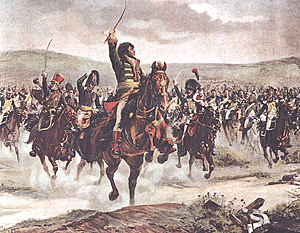Jena Auerstadt
A Day of Lost Opportunities
Introduction
by Patrick E. Wilson
| |
One of the most enduring images of the Battle of Jena-Auerstädt for me is the painting by H. Chartier of Marechal Prince Joachim Murat leading his Dragoons with a mere whip in his hand in Pursuit of the vanquished Prussians. It seems to suggest that the French victory was a relatively easy matter and that that victory over the so-called ‘Museum piece’ which constituted the Prussian was a foregone conclusion.
Indeed, I believed this myself for many years until I had cause to read more deeply in the battle and then it became apparent to me that it was not as simple as I first thought. It also became apparent to me that the Prussian Army had had a number of opportunities to reverse the outcome of that day. Such is the subject of this essay. The war between Prussia and France in 1806 can be seen as inevitable, especially as Napoleon
seemed to be insensitive to the feelings of Prussia as he attempted to persuade a belligerent Britain to except his peace offers. He even offered to return Hanover to Britain despite having already given that minor state to Prussia in return for its neutrality.
This development, together with France’s violation of the Prussian territory of Ansbach during the Ulm campaign of 1805, played right into the hands of the War party at the Prussian court. Although, it is true that war could still have been avoided if Napoleon himself had taken notice of Prussia’s mobilisation when it began in August 1806. But Napoleon it seems could not bring himself to believe that Prussia would take him on by itself that autumn. Of course Prussia was not alone as she had signed a secret treaty with Russia, however it would take time for the Warriors of the Tsar to arrive. In the past the mere mobilisation of the Prussian Army would have been enough to cow erstwhile opponents. Napoleon, however, was not, he was just incredulous!
This would also explain the lack of a Prussian central plan. If the Prussians expected Napoleon to be cowed by the fear of conflict with the much-vaunted Prussian Army, then there was no need for a plan of campaign.
Napoleon would simply back down and treat Prussia with the respect it was due. The fact that this did not happen left the Prussian high command with a problem. This in turn led to the production of a number of plans by the different army fractions, none of which eventually adopted in its entirety, with Scharnhorst commenting bitterly that: ‘In War it was not so much what one did that mattered, but that whatever action was agreed upon should be carried out with unity and energy’. [1]
The net result of this was that Napoleon, when he did eventually convince himself that Prussia was in earnest, found the Prussians in the same area that they had occupied in early September and seized the initiative from them. Still the fighting that ensured was severe and difficult for the
French, the ordinary Prussian if not their officers, proving to be tough opponents.
Jena Auerstadt: A Day of Lost Opportunities Introduction
|
